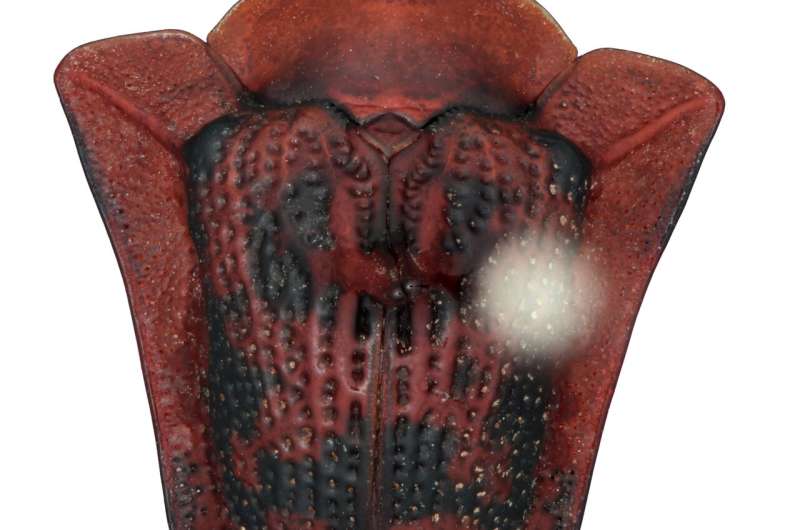Senckenberg researcher Dr. Marianna Simões, together with her colleague Dr. Lukáš Sekerka of the National Museum in Prague, discovered a new species from the tortoise-beetle genus. The insect, newly described as Dorynota phoenix in the journal Zootaxa, comes from the collections of the Brazilian National Museum in Rio de Janeiro, which were almost completely destroyed by an out-of-control fire in 2018.
Large parts of the 200-year-old National Museum and its archives in Rio de Janeiro were destroyed by a major fire on September 2, 2018. “The Brazilian collections of the National Museum held more than 20 million objects of inestimable value. They included the oldest collection of ancient Egyptian exhibits in the Americas, the largest meteorite discovered in Brazil, and Brazil’s first complete dinosaur fossil.
“The inventory also included one of the largest reference collections of insect diversity in South America—with an extensive beetle collection of more than two million specimens representing a wide range of species,” explains Dr. Marianna Simões from the Senckenberg Research Institute and Natural History Museum Frankfurt. “Except for a few pieces on loan that were not present in Rio de Janeiro at the time of the fire, these collections were irretrievably lost.”
The Frankfurt entomologist has now examined one of the rare, still preserved specimens on loan with Dr. Lukáš Sekerka, a scientist at the National Museum in Prague. “The insect, which is about 11 millimeters long and ten millimeters wide, belongs to the tortoise-beetle genus, which currently comprises 18 species that are widespread in the neotropical region from Mexico to northern Argentina. We quickly realized that the present specimen has features that clearly set it apart from the other described species of the genus,” says Simões.

The two researchers christened their newly discovered species Dorynota phoenix—the second name referring to the mythical bird that burns at the end of its life cycle, only to rise anew from its ashes. “With this name, we wanted to draw attention to the fact that the collection piece was miraculously saved from the devastating fire at the museum. The small beetle is meant to serve as a symbol of the museum’s remarkable rebuilding from the ashes—the entire museum is already scheduled to reopen in 2025.
“The newly discovered species also shows once again the crucial role that museums play in the conservation and understanding of biodiversity and how important it is to protect these ‘archives of nature,'” says Simões.
More information:
Marianna V. P. SimõEs et al, A new species in the tortoise-beetle genus Dorynota s. str. Chevrolat (Coleoptera: Chrysomelidae: Cassidinae: Dorynotini) from Brazil, Zootaxa (2023). DOI: 10.11646/zootaxa.5311.3.7
Citation:
Beetle specimen spared in fire at Brazilian National Museum turns out to be new species (2023, July 19)
retrieved 19 July 2023
from https://phys.org/news/2023-07-beetle-specimen-brazilian-national-museum.html
This document is subject to copyright. Apart from any fair dealing for the purpose of private study or research, no
part may be reproduced without the written permission. The content is provided for information purposes only.

